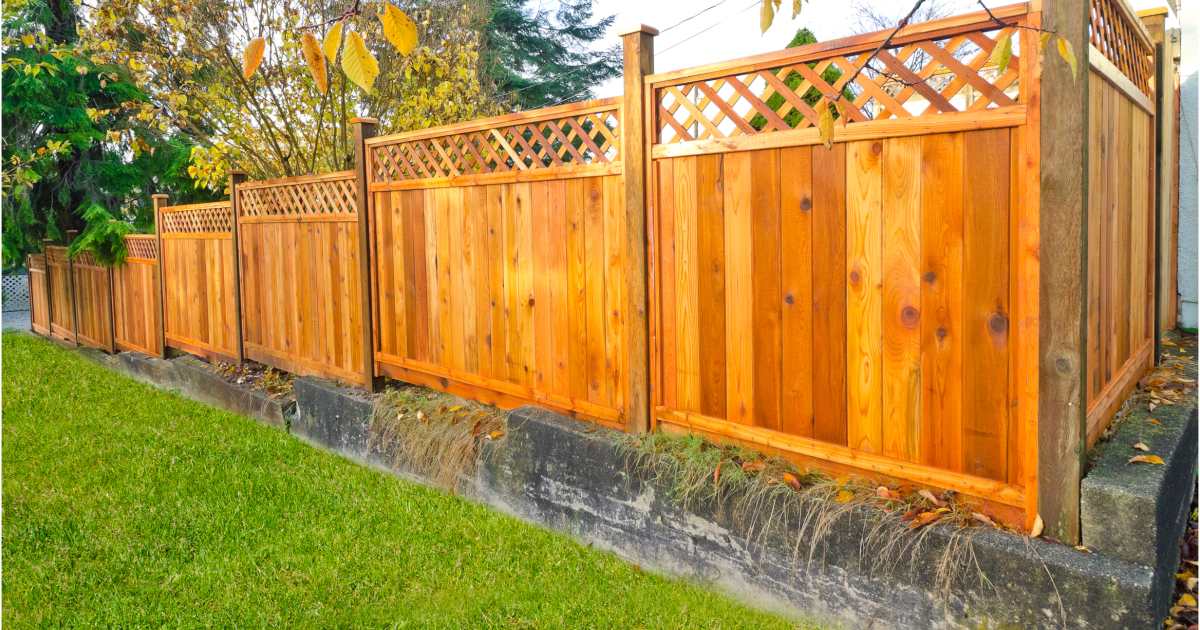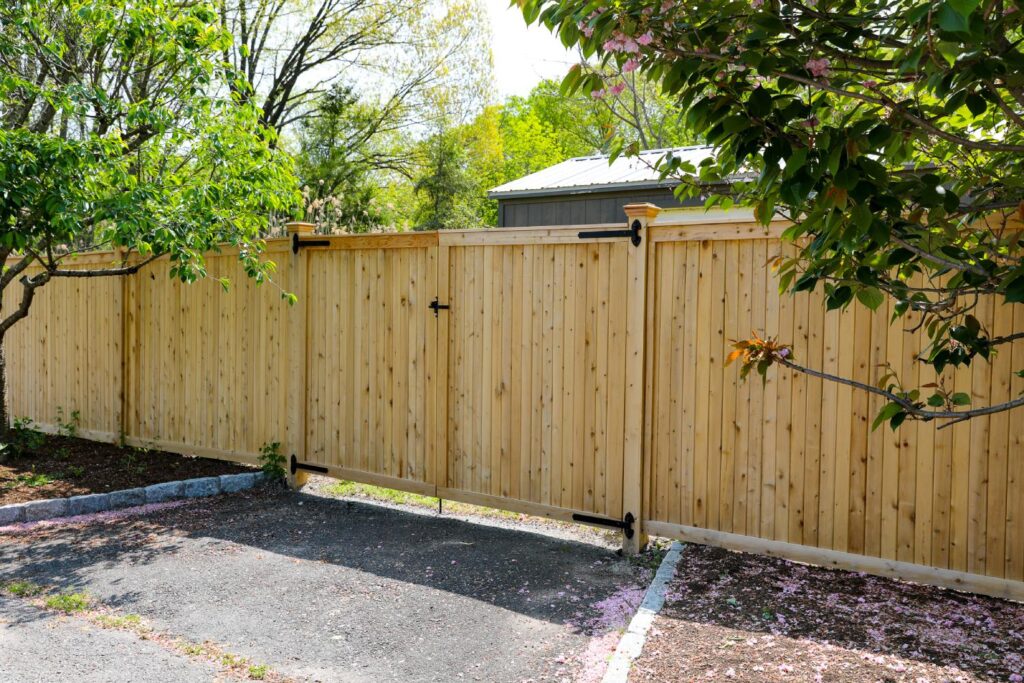All Categories
Featured
Choosing the best fencing material for your residential property is a significant choice, and each alternative features its very own collection of benefits and challenges. Wood, vinyl, and light weight aluminum are amongst the most popular materials for both household and commercial fence. Below's a failure of the benefits and drawbacks of each to aid you determine which is finest for your needs.
Timber Fencing. Pros:
Aesthetic Appeal: Timber uses a classic, all-natural look that complements practically any kind of design of residential property. It can be repainted or discolored in a vast array of shades, enabling full customization. Whether you're aiming for a rustic, country-style look or a more polished and polished appearance, timber is versatile.
Cost-Effective: Generally, timber fences are among one of the most economical options when it comes to upfront costs. It's an excellent alternative for those on a spending plan that want a top quality fence without a high cost.
![]()
Modification: Wood can be quickly adapted to fit any type of shape or size. You can choose from various styles such as privacy, picket, or ranch-style fences. It's also easy to modify, fix, or change components if necessary.
Disadvantages:
Maintenance: Wood fences call for regular maintenance. They need to be stained or painted periodically to avoid warping, bug, or rot infestation. Without maintenance, timber can deteriorate much faster, especially in damp or wet environments.
Susceptibility to Damages: Wood is prone to damage from insects, such as termites, and weather conditions, like high winds, rainfall, or snow. Over time, direct exposure to these aspects can trigger the wood to break, splinter, or warp.
Shorter Lifespan: While timber fencings can last for numerous years, they generally have a much shorter lifespan contrasted to vinyl or light weight aluminum, particularly if not maintained consistently.
Vinyl Secure Fencing. Pros:
Low Maintenance: One of one of the most eye-catching functions of plastic fences is that they need little to no upkeep. Unlike timber, plastic does not need to be repainted or stained. It's resistant to fading, cracking, and warping, making it suitable for those that want an easy fence.
Resilience: Plastic fencings are incredibly sturdy and can withstand rough weather, including extreme warm, heavy rain, or snow. They're likewise immune to bugs like termites, which can destroy wood fences.
Lengthy Life-span: Vinyl fencings can last for 20-30 years or even more with marginal maintenance. Lots of makers offer service warranties, giving peace of mind and more enhancing the value of your investment.
![]()
Variety of Styles: Offered in a series of shades, structures, and styles, vinyl fences can simulate the appearance of timber but without the upkeep. They are available in vogue like personal privacy, picket, and decorative, making them highly customizable.
Cons:
Greater First Cost: The ahead of time expense of vinyl fence is usually more than wood, making it less affordable for some. Nevertheless, its longevity and reduced upkeep make it a worthwhile investment over time.
Fragile in Winter: In chillier climates, vinyl can become fragile with time, that makes it more vulnerable to breaking if based on influence. This might be a problem in areas with severe winters.
Restricted Customization: While vinyl can be found in a selection of design and colors, it's not as adjustable as timber. Vinyl may not be the finest option. if you have a very certain vision in mind.
Light Weight Aluminum Fence. Pros:
Low Maintenance: Light weight aluminum is another product that calls for extremely little maintenance. Unlike timber, it does not corrosion, wear away, or fade. This makes it excellent for environments with severe weather condition or seaside areas where saltwater could trigger rust.
Durability: Aluminum fencings are recognized for their stamina and lengthy life-span. They can stand up to severe climate, and unlike wood or plastic, they are immune to pests and won't deteriorate over time.
![]()
Aesthetic Appeal: Aluminum fences offer a sleek, sophisticated look and are usually used for decorative purposes. They are readily available in different styles and coatings and can boost the total aesthetic appeal of your building.
Safety: Light weight aluminum is a durable material, making it an outstanding alternative for supplying safety around your residential property. It's usually used for domestic safety fencing in addition to for pool enclosures.
Cons:
Cost: Light weight aluminum fences are typically more costly than timber and occasionally also vinyl, specifically when going with attractive or personalized designs. The preliminary expense might be a deterrent for some homeowner.
Less Personal Privacy: Among the drawbacks of aluminum is that it typically offers less personal privacy compared to timber or vinyl. The spaces between the bars or slats can be broad, which enables people to see via the fence. This may not be the finest option. if personal privacy is important to you.
Denting: While light weight aluminum is long lasting, it is prone to nicking from heavy impacts, such as vehicle accidents or criminal damage. While it will not corrosion, a dent can compromise its look and integrity.
Which Material Should You Choose? The choice between plastic, timber, and aluminum secure fencing comes down to your spending plan, the amount of maintenance you're willing to take care of, and the details requirements of your residential or commercial property. If you choose a natural, adjustable look and are ready to preserve it, wood may be the means to go.
Consider your residential property's climate, the degree of privacy or protection you require, and the long-term investment you're ready to make. Whichever product you pick, each deals special benefits that can boost your home or company while offering capability and style.
Timber Fencing. Pros:
Aesthetic Appeal: Timber uses a classic, all-natural look that complements practically any kind of design of residential property. It can be repainted or discolored in a vast array of shades, enabling full customization. Whether you're aiming for a rustic, country-style look or a more polished and polished appearance, timber is versatile.
Cost-Effective: Generally, timber fences are among one of the most economical options when it comes to upfront costs. It's an excellent alternative for those on a spending plan that want a top quality fence without a high cost.

Modification: Wood can be quickly adapted to fit any type of shape or size. You can choose from various styles such as privacy, picket, or ranch-style fences. It's also easy to modify, fix, or change components if necessary.
Disadvantages:
Maintenance: Wood fences call for regular maintenance. They need to be stained or painted periodically to avoid warping, bug, or rot infestation. Without maintenance, timber can deteriorate much faster, especially in damp or wet environments.
Susceptibility to Damages: Wood is prone to damage from insects, such as termites, and weather conditions, like high winds, rainfall, or snow. Over time, direct exposure to these aspects can trigger the wood to break, splinter, or warp.
Shorter Lifespan: While timber fencings can last for numerous years, they generally have a much shorter lifespan contrasted to vinyl or light weight aluminum, particularly if not maintained consistently.
Vinyl Secure Fencing. Pros:
Low Maintenance: One of one of the most eye-catching functions of plastic fences is that they need little to no upkeep. Unlike timber, plastic does not need to be repainted or stained. It's resistant to fading, cracking, and warping, making it suitable for those that want an easy fence.
Resilience: Plastic fencings are incredibly sturdy and can withstand rough weather, including extreme warm, heavy rain, or snow. They're likewise immune to bugs like termites, which can destroy wood fences.
Lengthy Life-span: Vinyl fencings can last for 20-30 years or even more with marginal maintenance. Lots of makers offer service warranties, giving peace of mind and more enhancing the value of your investment.

Variety of Styles: Offered in a series of shades, structures, and styles, vinyl fences can simulate the appearance of timber but without the upkeep. They are available in vogue like personal privacy, picket, and decorative, making them highly customizable.
Cons:
Greater First Cost: The ahead of time expense of vinyl fence is usually more than wood, making it less affordable for some. Nevertheless, its longevity and reduced upkeep make it a worthwhile investment over time.
Fragile in Winter: In chillier climates, vinyl can become fragile with time, that makes it more vulnerable to breaking if based on influence. This might be a problem in areas with severe winters.
Restricted Customization: While vinyl can be found in a selection of design and colors, it's not as adjustable as timber. Vinyl may not be the finest option. if you have a very certain vision in mind.
Light Weight Aluminum Fence. Pros:
Low Maintenance: Light weight aluminum is another product that calls for extremely little maintenance. Unlike timber, it does not corrosion, wear away, or fade. This makes it excellent for environments with severe weather condition or seaside areas where saltwater could trigger rust.
Durability: Aluminum fencings are recognized for their stamina and lengthy life-span. They can stand up to severe climate, and unlike wood or plastic, they are immune to pests and won't deteriorate over time.

Aesthetic Appeal: Aluminum fences offer a sleek, sophisticated look and are usually used for decorative purposes. They are readily available in different styles and coatings and can boost the total aesthetic appeal of your building.
Safety: Light weight aluminum is a durable material, making it an outstanding alternative for supplying safety around your residential property. It's usually used for domestic safety fencing in addition to for pool enclosures.
Cons:
Cost: Light weight aluminum fences are typically more costly than timber and occasionally also vinyl, specifically when going with attractive or personalized designs. The preliminary expense might be a deterrent for some homeowner.
Less Personal Privacy: Among the drawbacks of aluminum is that it typically offers less personal privacy compared to timber or vinyl. The spaces between the bars or slats can be broad, which enables people to see via the fence. This may not be the finest option. if personal privacy is important to you.
Denting: While light weight aluminum is long lasting, it is prone to nicking from heavy impacts, such as vehicle accidents or criminal damage. While it will not corrosion, a dent can compromise its look and integrity.
Which Material Should You Choose? The choice between plastic, timber, and aluminum secure fencing comes down to your spending plan, the amount of maintenance you're willing to take care of, and the details requirements of your residential or commercial property. If you choose a natural, adjustable look and are ready to preserve it, wood may be the means to go.
Consider your residential property's climate, the degree of privacy or protection you require, and the long-term investment you're ready to make. Whichever product you pick, each deals special benefits that can boost your home or company while offering capability and style.
Latest Posts
Explore Exclusive Auto Repair Offers in Chicago at Montclare Auto Repair
Published May 26, 25
1 min read
Discover Save Big on Car Maintenance with Montclare Auto Repair’s Limited-Time Deals
Published May 26, 25
1 min read
How to Know When Your Car Needs Expert Vehicle Service at Montclare Auto Repair
Published May 25, 25
1 min read
More
Latest Posts
Explore Exclusive Auto Repair Offers in Chicago at Montclare Auto Repair
Published May 26, 25
1 min read
Discover Save Big on Car Maintenance with Montclare Auto Repair’s Limited-Time Deals
Published May 26, 25
1 min read
How to Know When Your Car Needs Expert Vehicle Service at Montclare Auto Repair
Published May 25, 25
1 min read